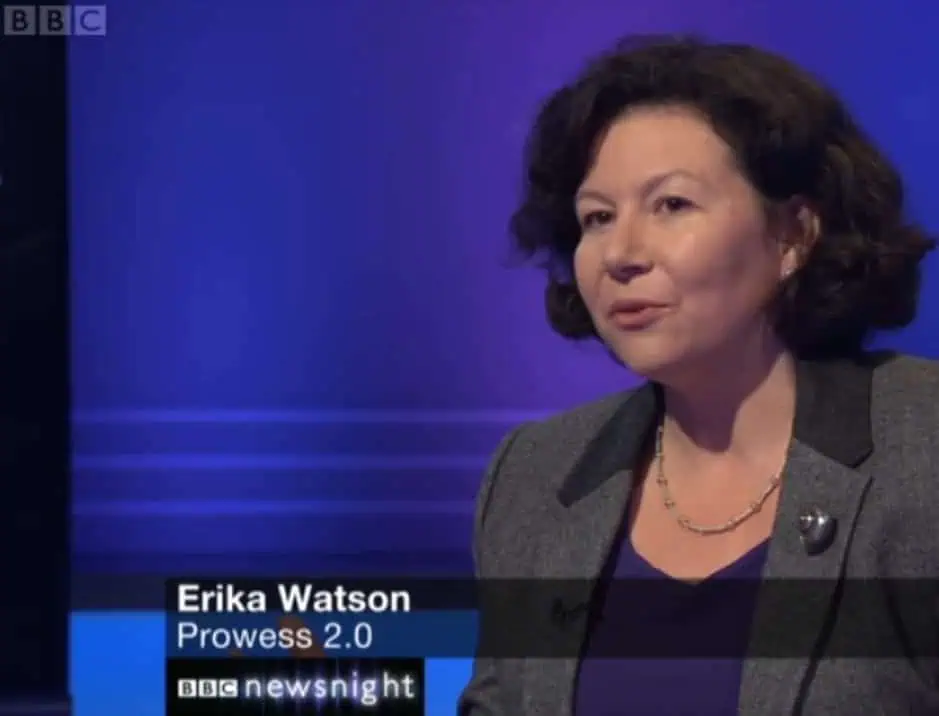The BBC ran a story on the phenomenal increase in the numbers of self-employed in the UK since 2008. The number of self-employed has increased by 367,000 to 4.2 million, while the numbers of employees fell by 434,000.
What the BBC failed to mention was that most of those new self-employed are women (53%). In fact, 80% of those who became self-employed between 2008 and 2011 are women. Not a single new business owner interviewed by the Newsnight report team was a woman.
Silent revolution
Erika calls it a “silent revolution”. One of the reasons why it is silent is because the media and government have ignored the story and its implications. Erika debated on BBC Newsnight with Fraser Nelson, editor of The Spectator, who thinks the changes are a normal reaction to recession and part of a longer term change in the way the British work.
But the scale of this change is not something we have seen before – and particularly the impact on women. The government has made a lot of noise about the new jobs it has created. As Erika pointed out on Newsnight, 84% of the new jobs created by the private sector are provided by the self-employed.
“This is a cause for celebration if you have the infrastructure in place to really support people to make the best of this opportunity,” said Erika. It is a massive labour market shift. And with it there is a huge transfer of risk from large companies and the state to individuals. “What support are these people getting to ensure they are the employers and the success stories of the future?” Erika asked.
Learning to survive and thrive in business when you haven’t done it before can be tough. Skills training and support increases business survival rates. But business support and information services have been decimated by recent cuts. Women’s business support organisations have been particularly hard hit.
Big business gets support
It’s not just the banks that are being supported back to health during this downturn. The Regional Growth Fund has provided many big companies with £33,000 for each new job they create, according to the National Audit Office. By contrast, the budget for each new self-employed business was reported to be £400 – and that was before recent reforms shifting business support delivery for the unemployed over to volunteer mentors.
“We know that women really appreciate, value, and benefit from skills support when they make this kind of transition,” said Erika. “In previous recessions the government had a skills strategy. Now, it is laissez fair: people are left to get on with it alone. It is not good enough.”
The BBC Newsnight discussion on self-employment is available on iplayer until 13 February. The discussion starts 31 minutes into the programme.


RT @WomensBiz: We were on Newsnight yesterday, speaking up about the surge in women’s self-employment… http://t.co/FflZNDwh
RT @WomensBiz: We were on Newsnight yesterday, speaking up about the surge in women’s self-employment… http://t.co/FflZNDwh
So proud and pleased to read this – 80% of new entrepreneurs are women! #womeninbusinessrock# http://t.co/4AnADB2b
RT @rkcoaching: So proud and pleased to read this – 80% of new entrepreneurs are women! #womeninbusinessrock# http://t.co/4AnADB2b http://t.co/DRSNXlib
Go ERIKA – and tell it how it is for all of us who have been together creating the shared Vision for Women’s Enterprise in the UK, assembling resources and investment funds, driving the issue of increased opportunity for women entrepreneurs It’s the old story, an overnight success that has taken years of inspiration, innovation and determination – UK Women’s Enterprise Taskforce, UK Women’s Enterprise Ambassadors, UK RegionalDevelopment Agencies Women’s Enterprise Champions, Global Entrepreneurship Monitor…and the list goes on….
Excellent stuff. I felt the old buzz and thought of the golden age of the women’s enterprise agenda which ended so abruptly on a sunny day in May 2010!
Prowess 2.0 Speaks Out for Women’s Business on BBC Newsnight – http://t.co/axn92ZDS
Prowess 2.0 Speaks Out for Women’s Business on BBC Newsnight – http://t.co/vr29dxVz
Thanks to @ErikaWatson Prowess 2.0 Speaks Out for Women’s Business on BBC Newsnight – http://t.co/A0poEq1m
The argument that ‘we haven’t made anyone do anything …’ is irresponsible. Thanks for pressing the point Erika. You stood your ground brilliantly – as I watched you, I began to hear an Ennio Morricone soundtrack… good stuff.